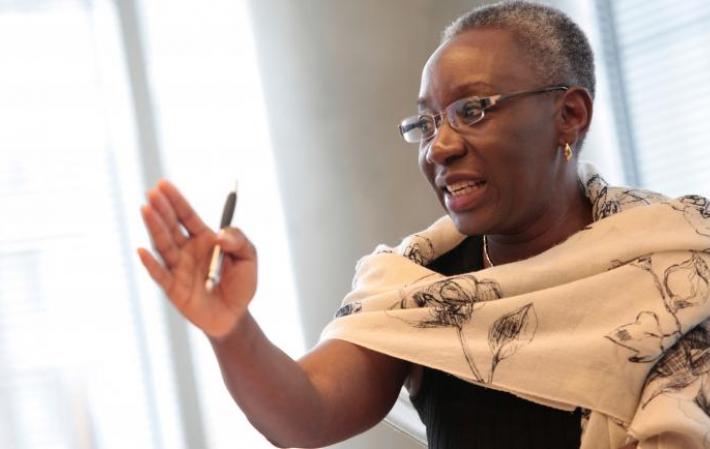
Sandra Pepera, Senior Associate and Director for NDI's Gender, Women and Democracy team.
In the past year, the DemWorks blog has become an established platform for sharing ideas on democratic development around the world. Since the DemWorks blog launched in February 2015, we have published over 159 posts and reached 108,000 users in 198 countries around the world. Here’s the list of the most-read blog posts and series from 2016.
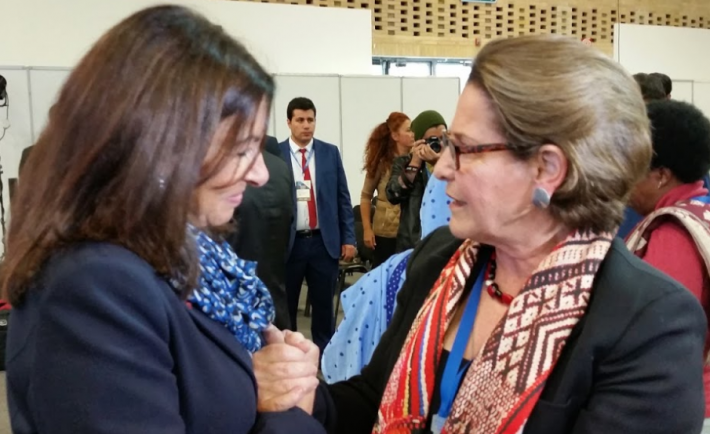
Susana Villarán (right) speaks with Anne Hidalgo, mayor of Paris, at the United Cities and Local Governments World Summit, in Bogota (October 2016).
"The world is not built or transformed without half of humanity, and because it is so difficult for us as women to achieve power and at the highest level in our cities, our commitment is to transform them," said Anne Hidalgo, mayor of Paris, at the United Cities and Local Government World Summit. Our delegation -- composed of women mayors and social leaders convened by the National Democratic Institute -- had the objective to radically deepen the gender perspective and the policies in favor of the rights of women living in cities embodied in the 175 articles of the New Urban Agenda (NUA) approved in Quito by the member states of the United Nations.
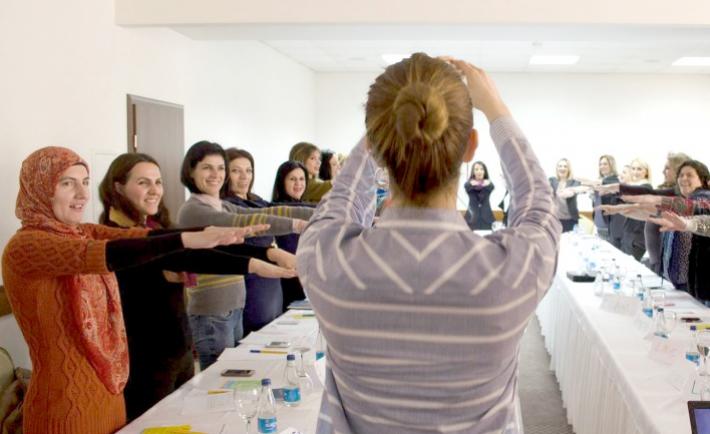
Cross-party training events like this one, part of the Women Political Empowerment Training conducted by NDI, would have a bigger impact if political parties in Kosovo became more inclusive and created a space for women and youth.
In a small country like Kosovo, in order to “get things done,” you need to be affiliated with a political party, understand how to navigate the political system and lobby hard for your cause. None of these requirements would be an issue if ideologies and policies were at the heart of discussion and negotiations. Instead, party affiliation in Kosovo is based on business relationships - not policy - and this political culture undermines internal party democracy.
Social media and the Internet have had a drastic effect on the surprise results of yesterday’s election in the United States, driving the spread of information—and misinformation—at times bringing voters together and, perhaps more often, pushing them apart. As the spotlight shifts off of the U.S. in the aftermath of November 8, it’s important to recognize that this is not a uniquely American trend. More than half of Internet users now report using social media as a primary source of news, according to a study across 26 countries, and more than one quarter call it their main news source. In developing countries where reliable news sources are more limited, those numbers may be even higher. As reliance on social media and the Internet for news and information rises exponentially, political discourse is also rapidly moving online. A free and open Internet, where citizens can engage in fair dialogue and access accurate information, is thus critical to modern democracy and human rights.
Headlines are warning us about Russian “mischief” in the U.S. elections. The U.S. Department of Homeland Security and the Director of National Intelligence have said they are confident that the Russian government is behind hacks into US email accounts and that cyber-probes of some state election systems may also be traced to Russia. A group of prominent national security and defense experts has predicted that Russian hackers will use the stolen emails to build credibility, then leak fake documents in order to manipulate voters’ opinions and, possibly, choices at the ballot box. These cyber-espionage and disinformation campaigns sound like the stuff of spy novels, except they’re real. What’s going on?
In late October, I joined a staff delegation of the House Democracy Partnership (HDP) in its assessment mission to explore a potential partnership between the U.S. Congress and the Congress of Guatemala, a unicameral body made up of 158 deputies elected for four-year terms. Having spent a good deal of time working to end the Central American wars in the 1980s as a congressional staffer in the U.S. House of Representatives, it was my first trip to the region in nearly three decades. I returned to the U.S. hopeful and cautiously optimistic that Guatemala may be turning a corner in its democratic development while still working to overcome the legacy of the brutal civil war that resulted in hundreds of thousands of victims from 1960-1996.
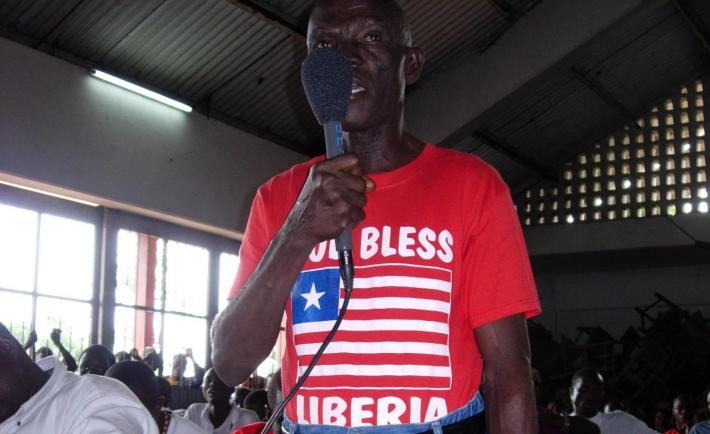
Citizens ask questions of candidates during NDI-supported senate debates in Liberia during the 2005 elections. Credit: Jim Della-Giacoma
Can there be peace without the United Nations? Maybe. Resilient democracies might also exist without direct intervention from international organizations. But given that NDI’s Resilient Democracy blog series was launched on the UN International Day of Peace, it would be useful to consider the role of international organizations and the evolving ideas they are promoting about sustaining peace and peaceful societies. Connecting to the UN’s macro thinking could strengthen NDI’s micro-level work.
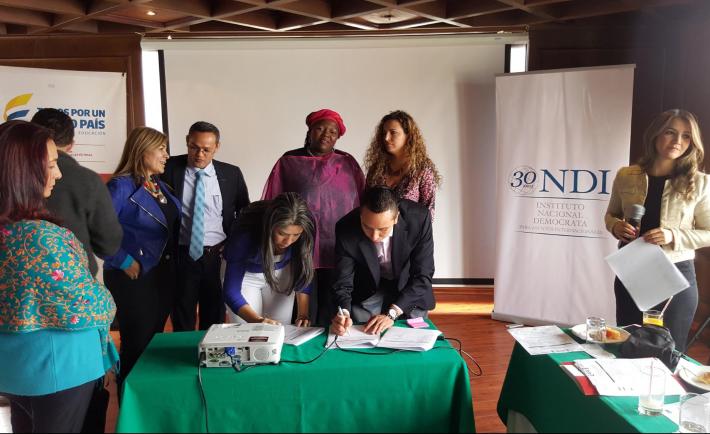
Presidents of federations of local assembly and council members and the Victims Unit Subdirector for Participation sign a collective reparations plan.
Countries transitioning out of violent conflict are more successful in achieving lasting peace when representative institutions are inclusive and manage reconciliation processes fairly. The end of violent conflict does not guarantee a political voice for former combatants or reintegration into society. By its nature, violence also generates victims, who must be central actors in the development of peace accords, reparations plans and transitional justice systems. In a post-conflict context, the development of transitional democratic political processes is necessary for fostering reconciliation and building peace. In this post – the fifth in NDI's series on resilient democracy – NDI Program Officer Austin Robles examines the peace negotiations and reconciliation process currently underway in Colombia.

Photos originally uploaded on Flickr by Gimnasio La Montaña ("#SoyCapaz") and frankieleon ("Brexit tea")
The outcomes of the June 23 Brexit vote and the October 2 referendum on the peace deal in Colombia raised questions about voting and political participation: How could something so unanticipated happen? Would people lose faith in democracy? Could we be similarly blindsided in the United States in November? Should we even vote at all?
Democratic elections resolve a legitimate competition for power through peaceful, rather than violent, means. They constitute a critical moment in the life of a democracy, where citizens have the right to express their will through the ballot box and a peaceful transfer of power takes place. However, this is not always the case. During the 2010 elections in Côte d’Ivoire – the country’s first election in 10 years – former President Laurent Gbagbo refused to step down after narrowly losing in a run-off to Alassane Ouattara, triggering widespread violence that left over 3,000 people dead and thousands displaced. To mitigate the potential for violence as the 2015 presidential election approached, NDI assisted civil society organizations to monitor the elections, draft Codes of Conduct and spread messages promoting nonviolent conflict resolution.